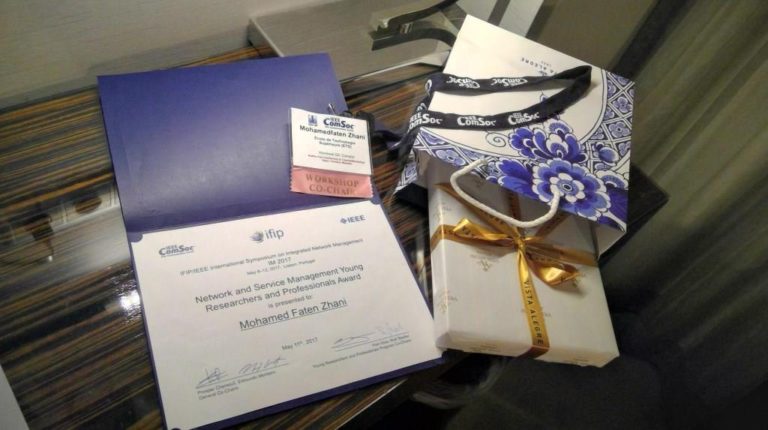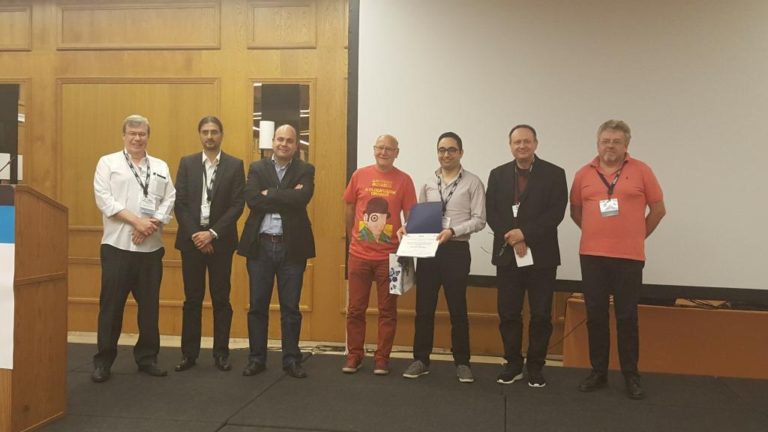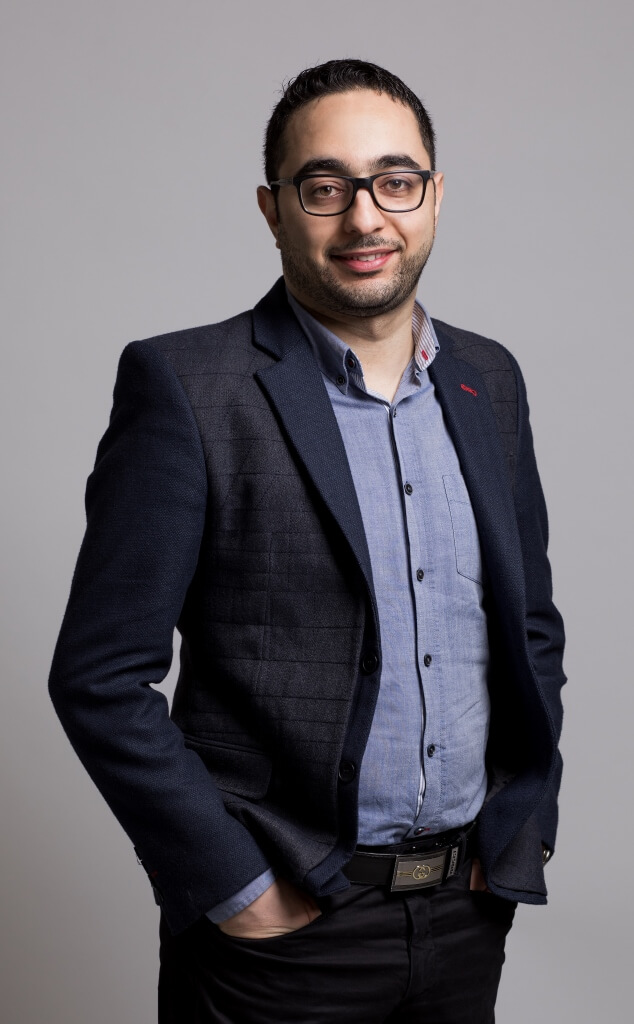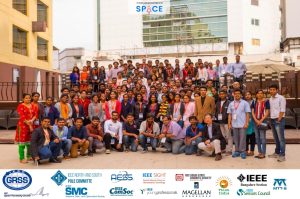Today we would like to introduce the IEEE/IFIP IM 2017 NSM Young Researchers and Professionals Award winner, Prof. Mohamed Faten Zhani. Prof. Zhani is an assistant professor in the department of Software and IT Engineering at the School of High Technology (École de Technologie Supérieure – ÉTS), University of Quebec, Montreal, Canada. Before that, he had been a postdoctoral research fellow at the David R. Cheriton School of Computer Science at the University of Waterloo (2011‑2014). He received his PhD in Computer Science from the University of Quebec in Montreal in 2011 and his MS and Engineering degrees from l’École Nationale des Sciences de l’Informatique (ENSI) in Tunisia in 2003 and 2005, respectively. His research interests are mainly focusing on emerging technologies like cloud computing, software defined networking, network function virtualization, performance evaluation, and data analytics applied to network and service management. Prof. Zhani authored or co‑authored more than 40 high-quality papers published in prestigious international conferences and journals on network and service management.
In his interview with IMPACT, Prof. Zhani inspires the IEEE young minds by sharing his career path and research achievements.

Nidhi: Prof. Zhani, first and foremost, heartiest congratulations to you on winning the 2017 NSM Young Researchers and Professionals Award! I would like to tell our audience that the purpose of this award is to recognize outstanding research contributions and leadership for young professionals in the field of Network and Service Management (NSM). The assessment was based on the level of contribution and leadership that an applicant has exhibited in the field of network and service management. Quality and quantity of the research work and publications; technical, economic, or societal impact of contributions; and the potential for wider and deeper impact were also some of the criteria for assessment for this award.
Prof. Zhani: Thank you.
Nidhi: Prof. Zhani, can you please tell us something about your research?
Prof. Zhani: In the last few years, I have been working on a variety of challenges pertaining to the design and management of large-scale networks, data centers and internet services. I have led and participated in several projects like the UW Google project that addressed several resource management challenges in large‑scale data centers and the NSERC SAVI project, a Canadian Project that aimed at designing and building the largest cloud testbed spanning Canada.
I am currently running the NSERC MASTER project that aims at designing scalable cloud management frameworks for futuristic cloud infrastructures. I am also one of six professors leading the NSERC NETSOFT CREATE, a Canadian research and training program that aims to train the Canadian and international researchers of tomorrow in emerging technologies like network function virtualization and software defined networking.
Nidhi: Can you please elaborate on your design solutions for large-scale network and service management?
Prof. Zhani: Yes, sure. Over the last few years, my research has been focusing on the design of large-scale network and service management solutions. I have worked on the design of scalable resource management solutions to dynamically allocate resources to virtual data centers and cloud services provisioned either within a single data center or across geo-distributed infrastructures. These solutions allow cloud providers to ensure high service performance, to guarantee service availability and fault-tolerance, to maximize cloud providers’ revenue, to reduce energy consumption and also to leverage green sources of energy. I have also extensively investigated the potential of virtual machine migration to ease resource management in centralized and distributed infrastructures and proposed efficient management schemes that leverage this feature to optimize resource allocation while taking into account several considerations (e.g., migration costs, service disruption and resource consumption).

Furthermore, my recent work deals with the management of SDN (software defined networking)/NFV (network function virtualization)-based services and networks. I participated to the design of a platform called DOT that allows researchers to emulate large-scale SDN networks over a cluster of servers (rather than a single server like in Mininet). I have also studied several challenges related to the deployment of the SDN/NFV technologies including profit-driven VNF service chaining and placement, dynamic multi-SDN controller provisioning and management, and traffic management in SDN networks.
Nidhi: What are the on-going projects you are working on? Can you please tell us something about those?
Prof. Zhani: After I became an assistant professor at ÉTS Montreal in 2015, I started three projects with some colleagues.
First is the MASTER project (sMart mAnagement for futuriStic daTa cEnteRs), which is a five-year project funded by the Natural Sciences and Engineering Research Council of Canada (NSERC). MASTER aims at designing scalable cloud management frameworks for futuristic infrastructures using emergent technologies like network function virtualization (NFV) and software defined networking (SDN) to accommodate the requirements of large-scale Internet applications in terms of performance and availability.
Second is the Ciena project funded by NSERC and Ciena Incorporated. The goal of the project is to analyze the traces collected in Ciena’s wide area networks to identify and characterize performance issues and to devise new network management solutions to address those issues.
Third is NETSOFT CREATE project, which is a Canadian research and training program aiming at training 112 students and postdoctoral fellows from Canada and abroad through the development of an innovative training program focusing on NFV/SDN technologies. This six-year program is supported by the NSERC and several industrial partners including Ericsson, TELUS, Bell Canada, Ciena, IBM Canada, InBay, and SynerSolutions.
Nidhi: Prof. Zhani, can you please tell us about your experience, services and contributions to the IEEE community?
Prof. Zhani: I joined IEEE in 2006 as a student member and a member of the IEEE Young Professionals, and since then I have been involved in the organization of several events, workshops, and conferences. For instance, I co-founded the IEEE/IFIP DISSECT workshop series that focuses on different security aspects of emerging network technologies. I have also co‑chaired several editions of the international workshop on CrossCloud Infrastructures & Platforms that focuses on the management of federated cloud infrastructures, a topic that has been gaining momentum recently. Last year, I co-organized the 2016 edition of the IEEE/ACM/IFIP conference on network and service management at my school ÉTS Montreal.
I am also a member of technical program committees and a regular reviewer for many journals and conferences for which I reviewed more than a hundred papers in the last two years.
I have also been the secretary of the IEEE ComSoc Technical sub-Committee on Autonomic Communications (TCAC) since 2013 and participated to the organization of many activities to promote autonomic network management, which I think is one of the main sought-after goals of our community.
I am an associate editor of the International Journal on Network Management (IJNM). I am also co-editing an IJNM Special Issue on Security for Emerging Open Networking Technologies to be published in September 2017.
Nidhi: As a young achiever yourself, can you please give our young readers your word of wisdom on how they could plan for a successful career?
Prof. Zhani: Sure, with pleasure. I think you just used the key word to answer your question: they need to “plan” for it. My advice is to think big, carefully select your goals, set up a plan to achieve them, work hard, never give up, and above all, enjoy what you do! And as a last word of wisdom, let me borrow a quote from Norman Vincent Peale that I particularly like: “Shoot for the moon. Even if you miss, you’ll land among the stars”. I think this quote gives the best advice for the young IEEE professionals.

Picture1: taken on May 11, 2017 at the Awards Ceremony of the IFIP/IEEE International Symposium on Integrated Network Management (IM 2017) in Lisbon, Portugal. From left to right: Edmundo Madeira (Professor at the University of Campinas, Brazil); Marinos Charalambides (Professor at UCL, UK); Paulo Simões (Professor at the University of Coimbra, Portugal); Prosper Chemouil (Director of Research Program in the area of Networks and Systems at Orange Labs, France); Mohamed Faten Zhani (Professor at ÉTS Montreal); Rolf Stadler (IEEE Young Professionals Program co-chair, Professor at KTH Royal Institute of Technology, Sweden); Edmundo Monteiro (University of Coimbra, Portugal)






